- Home
- Stephen Crane
Red Badge of Courage (Puffin Classics Relaunch)
Red Badge of Courage (Puffin Classics Relaunch) Read online
PUFFIN CLASSICS
THE RED BADGE
OF COURAGE
In his life he had taken certain things for granted, never challenging his belief in ultimate success, and bothering little about means and roads. But here he was confronted with a thing of moment. It had suddenly appeared to him that perhaps in a battle he might run. He was forced to admit that as far as war was concerned he knew nothing of himself.
STEPHEN CRANE
THE RED BADGE
OF COURAGE
An episode of the American Civil War
INTRODUCED BY
WENDELL MINOR
PUFFIN
PUFFIN BOOKS
Published by the Penguin Group
Penguin Books Ltd, 80 Strand, London WC2R 0RL, England
Penguin Group (USA) Inc., 375 Hudson Street, New York, New York 10014, USA
Penguin Group (Canada), 90 Eglinton Avenue East, Suite 700, Toronto, Ontario, Canada M4P 2Y3
(a division of Pearson Penguin Canada Inc.)
Penguin Ireland, 25 St Stephen’s Green, Dublin 2, Ireland (a division of Penguin Books Ltd)
Penguin Group (Australia), 250 Camberwell Road, Camberwell, Victoria 3124, Australia
(a division of Pearson Australia Group Pty Ltd)
Penguin Books India Pvt Ltd, 11 Community Centre, Panchsheel Park, New Delhi – 110 017, India
Penguin Group (NZ), 67 Apollo Drive, Rosedale, North Shore 0632, New Zealand
(a division of Pearson New Zealand Ltd)
Penguin Books (South Africa) (Pty) Ltd, 24 Sturdee Avenue,
Rosebank, Johannesburg 2196, South Africa
Penguin Books Ltd, Registered Offices: 80 Strand, London WC2R 0RL, England
puffinbooks.com
First published in the USA by D. Appleton & Company 1895
‘The Veteran’ first published in The Little Regiment and Other Episodes of the American Civil War
by D. Appleton & Company 1896
This edition published in the Penguin American Library 1983
Published in Puffin Books 1986
Reissued in this edition 2009
Introduction copyright © Wendell Minor, 2009
Endnotes copyright © Penguin Books, 2009
All rights reserved
Except in the United States of America, this book is sold subject to the condition that it shall not, by way of trade or otherwise, be lent, re-sold, hired out, or otherwise circulated without the publisher’s prior consent in any form of binding or cover other than that in which it is published and without a similar condition including this condition being imposed on the subsequent purchaser
ISBN: 978-0-14-195535-3
INTRODUCTION BY
WENDELL MINOR
Can you imagine being a published reporter by the age of sixteen, or writing your first novel at twenty-two? Stephen Crane was a mere twenty-four years old when his great novel The Red Badge of Courage was first published. Before he turned twenty-nine he had died of tuberculosis. His life was like a meteor that burned brightly in the night sky and then vanished. But the everlasting impression of that light remains as bright as ever.
The Red Badge of Courage has never been out of print since it was first published in 1895. To this day it is a novel that stands as one of the most dramatic and definitive war stories of all time. What makes The Red Badge of Courage even more remarkable is that Stephen Crane was born in 1871, when the American Civil War (1860–65) was over. It was the skill he developed as a reporter that gave him the grounding to ask questions of the men who were there – the Civil War veterans. What were their stories? Through enquiry and imagination Crane recreated a story so convincing that many thought for certain he too was a veteran of that war.
Crane introduces us to Henry Fleming, a young teenager who seeks adventure and a sense of independence. I suppose there is a bit of Henry Fleming in all of us. We want to know what we’re made of. Can we strike out in the world and survive, and even thrive, on our own? Challenging ourselves and overcoming our insecurities is a natural part of growing up.
Who am I? What do I believe in? Will I measure up? The story of Henry Fleming takes us on a timeless journey of self-discovery. As a recruit in the Union army, young Henry leaves his home to seek adventure and fight against the army of the Confederacy. He soon discovers that confronting his fear of battle is all consuming.
You will learn how Henry deals with this personal dilemma of cowardice versus courage. As events unfold, Henry questions everything as he digs deep within his soul to find the truth about himself.
What is unique about The Red Badge of Courage is that Crane places you on the battlefield with Henry. How do you think you would react if you were in his place? Would you hold your ground or run? Could you come to terms with yourself in order to get the job done? It is believed that Crane set the action at the Battle of Chancellorsville in Virginia in May 1863 where some 18,000 men were killed or wounded in a matter of hours. It is very difficult to imagine that kind of carnage on such a scale. That’s why seeing it from Henry Fleming’s point of view brings the battle down to a human level. An army must function as a team, but it is the individual working in harmony with the team that ultimately wins life’s battles. Just as a young soldier goes through his rite of passage into adulthood in his own time and place, so must you in yours. May you learn something about yourself after spending time with Henry Fleming.
Contents
The Red Badge of Courage
‘The Veteran’
The Red Badge of Courage
1
The cold passed reluctantly from the earth, and the retiring fogs revealed an army stretched out on the hills, resting. As the landscape changed from brown to green, the army awakened, and began to tremble with eagerness at the noise of rumors. It cast its eyes upon the roads, which were growing from long troughs of liquid mud to proper thoroughfares. A river, amber-tinted in the shadow of its banks, purled at the army’s feet; and at night, when the stream had become of a sorrowful blackness, one could see across it the red, eyelike gleam of hostile camp-fires set in the low brows of distant hills.
Once a certain tall soldier developed virtues and went resolutely to wash a shirt. He came flying back from a brook waving his garment bannerlike. He was swelled with a tale he had heard from a reliable friend, who had heard it from a truthful cavalryman, who had heard it from his trustworthy brother, one of the orderlies at division headquarters. He adopted the important air of a herald in red and gold.
‘We’re goin’ t’ move t’morrah – sure,’ he said pompously to a group in the company street. ‘We’re goin’ ’way up the river, cut across, an’ come around in behint ’em.’
To his attentive audience he drew a loud and elaborate plan of a very brilliant campaign. When he had finished, the blue-clothed men scattered into small arguing groups between the rows of squat brown huts. A negro teamster who had been dancing upon a cracker box with the hilarious encouragement of twoscore soldiers was deserted. He sat mournfully down. Smoke drifted lazily from a multitude of quaint chimneys.
‘It’s a lie, that’s all it is – a thunderin’ lie!’ said another private loudly. His smooth face was flushed, and his hands were thrust sulkily into his trousers’ pockets. He took the matter as an affront to him. ‘I don’t believe the derned old army’s ever going to move. We’re set. I’ve got ready to move eight times in the last two weeks, and we ain’t moved yet.’
The tall soldier felt called upon to defend the truth of a rumor he himself had introduced. He and the loud one came near to fighting over it.
A corporal began to
swear before the assemblage. He had just put a costly board floor in his house, he said. During the early spring he had refrained from adding extensively to the comfort of his environment because he had felt that the army might start on the march at any moment. Of late, however, he had been impressed that they were in a sort of eternal camp.
Many of the men engaged in a spirited debate. One outlined in a peculiarly lucid manner all the plans of the commanding general. He was opposed by men who advocated that there were other plans of campaign. They clamored at each other, numbers making futile bids for the popular attention. Meanwhile, the soldier who had fetched the rumor bustled about with much importance. He was continually assailed by questions.
‘What’s up, Jim?’
‘Th’ army’s goin’ t’move.’
‘Ah, what yeh talkin’ about? How yeh know it is?’
‘Well, yeh kin b’lieve me er not, jest as yeh like. I don’t care a hang.’
There was much food for thought in the manner in which he replied. He came near to convincing them by disdaining to produce proofs. They grew much excited over it.
There was a youthful private who listened with eager ears to the words of the tall soldier and to the varied comments of his comrades. After receiving a fill of discussions concerning marches and attacks, he went to his hut and crawled through an intricate hole that served it as a door. He wished to be alone with some new thoughts that had lately come to him.
He lay down on a wide bunk that stretched across the end of the room. In the other end, cracker boxes were made to serve as furniture. They were grouped about the fireplace. A picture from an illustrated weekly was upon the log walls, and three rifles were paralleled on pegs. Equipments hung on handy projections, and some tin dishes lay upon a small pile of firewood. A folded tent was serving as a roof. The sunlight, without, beating upon it, made it glow a light yellow shade. A small window shot an oblique square of whiter light upon the cluttered floor. The smoke from the fire at times neglected the clay chimney and wreathed into the room, and this flimsy chimney of clay and sticks made endless threats to set ablaze the whole establishment.
The youth was in a little trance of astonishment. So they were at last going to fight. On the morrow, perhaps, there would be a battle, and he would be in it. For a time he was obliged to labor to make himself believe. He could not accept with assurance an omen that he was about to mingle in one of those great affairs of the earth.
He had, of course, dreamed of battles all his life – of vague and bloody conflicts that had thrilled him with their sweep and fire. In visions he had seen himself in many struggles. He had imagined peoples secure in the shadow of his eagle-eyed prowess. But awake he had regarded battles as crimson blotches on the pages of the past. He had put them as things of the bygone with his thought-images of heavy crowns and high castles. There was a portion of the world’s history which he had regarded as the time of wars, but it, he thought, had been long gone over the horizon and had disappeared forever.
From his home his youthful eyes had looked upon the war in his own country with distrust. It must be some sort of a play affair. He had long despaired of witnessing a Greeklike struggle. Such would be no more, he had said. Men were better, or more timid. Secular and religious education had effaced the throat-grappling instinct, or else firm finance held in check the passions.
He had burned several times to enlist. Tales of great movements shook the land. They might not be distinctly Homeric, but there seemed to be much glory in them. He had read of marches, sieges, conflicts, and he had longed to see it all. His busy mind had drawn for him large pictures extravagant in color, lurid with breathless deeds.
But his mother had discouraged him. She had affected to look with some contempt upon the quality of his war ardor and patriotism. She could calmly seat herself and with no apparent difficulty give him many hundreds of reasons why he was of vastly more importance on the farm than on the field of battle. She had had certain ways of expression that told him that her statements on the subject came from a deep conviction. Moreover, on her side, was his belief that her ethical motive in the argument was impregnable.
At last, however, he had made firm rebellion against this yellow light thrown upon the color of his ambitions. The newspapers, the gossip of the village, his own picturings, had aroused him to an uncheckable degree. They were in truth fighting finely down there. Almost every day the newspapers printed accounts of a decisive victory.
One night, as he lay in bed, the winds had carried to him the clangoring of the church bell as some enthusiast jerked the rope frantically to tell the twisted news of a great battle. This voice of the people rejoicing in the night had made him shiver in a prolonged ecstasy of excitement. Later, he had gone down to his mother’s room and had spoken thus: ‘Ma, I’m going to enlist.’
‘Henry, don’t you be a fool,’ his mother had replied. She had then covered her face with the quilt. There was an end to the matter for that night.
Nevertheless, the next morning he had gone to a town that was near his mother’s farm and had enlisted in a company that was forming there. When he had returned home his mother was milking the brindle cow. Four others stood waiting. ‘Ma, I’ve enlisted,’ he had said to her diffidently. There was a short silence. ‘The Lord’s will be done, Henry,’ she had finally replied, and had then continued to milk the brindle cow.
When he had stood in the doorway with his soldier’s clothes on his back, and with the light of excitement and expectancy in his eyes almost defeating the glow of regret for the home bonds, he had seen two tears leaving their trails on his mother’s scarred cheeks.
Still, she had disappointed him by saying nothing whatever about returning with his shield or on it. He had privately primed himself for a beautiful scene. He had prepared certain sentences which he thought could be used with touching effect. But her words destroyed his plans. She had doggedly peeled potatoes and addressed him as follows: ‘You watch out, Henry, an’ take good care of yerself in this here fighting business – you watch out, an’ take good care of yerself. Don’t go a-thinkin’ you can lick the hull rebel army at the start, because yeh can’t. Yer jest one little feller amongst a hull lot of others, and yeh’ve got to keep quiet an’ do what they tell yeh. I know how you are, Henry.
‘I’ve knet yeh eight pair of socks, Henry, and I’ve put in all yer best shirts, because I want my boy to be jest as warm and comf’able as anybody in the army. Whenever they get holes in ’em, I want yeh to send ’em right-away back to me, so’s I kin dern ’em.
‘An’ allus be careful an’ choose yer comp’ny. There’s lots of bad men in the army, Henry. The army makes ’em wild, and they like nothing better than the job of leading off a young feller like you, as ain’t never been away from home much and has allus had a mother, an’ a-learning ’em to drink and swear. Keep clear of them folks, Henry. I don’t want yeh to ever do anything, Henry, that yeh would be ’shamed to let me know about. Jest think as if I was a-watchin’ yeh. If yeh keep that in yer mind allus, I guess yeh’ll come out about right.
‘Yeh must allus remember yer father, too, child, an’ remember he never drunk a drop of licker in his life, and seldom swore a cross oath.
‘I don’t know what else to tell yeh, Henry, excepting that yeh must never do no shirking, child, on my account. If so be a time comes when yeh have to be kilt or do a mean thing, why, Henry, don’t think of anything ’cept what’s right, because there’s many a woman has to bear up ’ginst sech things these times, and the Lord ’ll take keer of us all.
‘Don’t forgit about the socks and the shirts, child; and I’ve put a cup of blackberry jam with yer bundle, because I know yeh like it above all things. Good-by, Henry. Watch out, and be a good boy.’
He had, of course, been impatient under the ordeal of this speech. It had not been quite what he expected, and he had borne it with an air of irritation. He departed feeling vague relief.
Still, when he had looked back from the gate, he had s
een his mother kneeling among the potato parings. Her brown face, upraised, was stained with tears, and her spare form was quivering. He bowed his head and went on, feeling suddenly ashamed of his purposes.
From his home he had gone to the seminary to bid adieu to many schoolmates. They had thronged about him with wonder and admiration. He had felt the gulf now between them and had swelled with calm pride. He and some of his fellows who had donned blue were quite overwhelmed with privileges for all of one afternoon, and it had been a very delicious thing. They had strutted.
A certain light-haired girl had made vivacious fun at his martial spirit, but there was another and darker girl whom he had gazed at steadfastly, and he thought she grew demure and sad at sight of his blue and brass. As he had walked down the path between the rows of oaks, he had turned his head and detected her at a window watching his departure. As he perceived her, she had immediately begun to stare up through the high tree branches at the sky. He had seen a good deal of flurry and haste in her movement as she changed her attitude. He often thought of it.
On the way to Washington his spirit had soared. The regiment was fed and caressed at station after station until the youth had believed that he must be a hero. There was a lavish expenditure of bread and cold meats, coffee, and pickles and cheese. As he basked in the smiles of the girls and was patted and complimented by the old men, he had felt growing within him the strength to do mighty deeds of arms.
After complicated journeyings with many pauses, there had come months of monotonous life in a camp. He had had the belief that real war was a series of death struggles with small time in between for sleep and meals; but since his regiment had come to the field the army had done little but sit still and try to keep warm.
He was brought then gradually back to his old ideas. Greeklike struggles would be no more. Men were better, or more timid. Secular and religious education had effaced the throat-grappling instinct, or else firm finance held in check the passions.

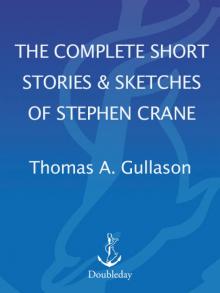 The Complete Short Stories and Sketches of Stephen Crane
The Complete Short Stories and Sketches of Stephen Crane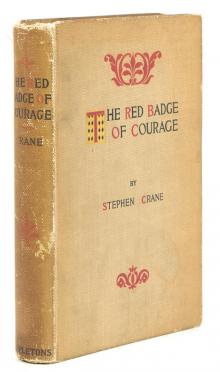 The Red Badge of Courage: An Episode of the American Civil War
The Red Badge of Courage: An Episode of the American Civil War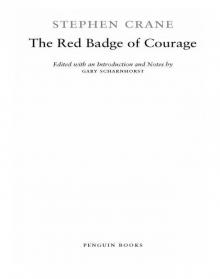 The Red Badge of Courage
The Red Badge of Courage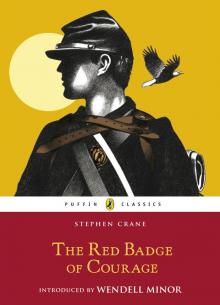 The Red Badge of Courage by Stephen Crane
The Red Badge of Courage by Stephen Crane Maggie, a Girl of the Streets and Other New York Writings
Maggie, a Girl of the Streets and Other New York Writings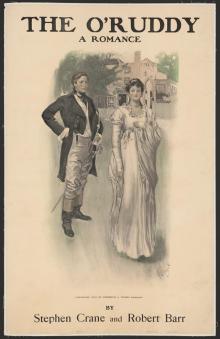 The O'Ruddy: A Romance
The O'Ruddy: A Romance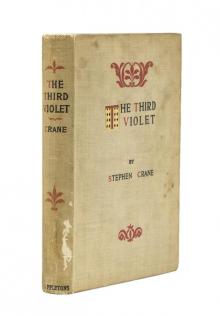 The Third Violet
The Third Violet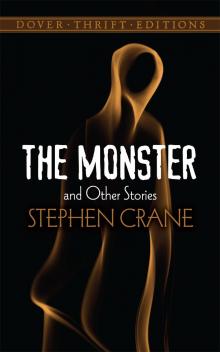 The Monster and Other Stories
The Monster and Other Stories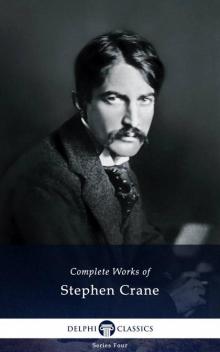 Complete Works of Stephen Crane
Complete Works of Stephen Crane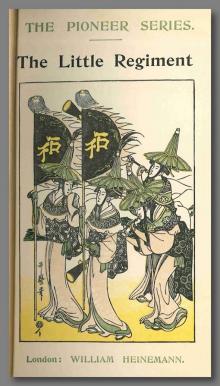 The Little Regiment, and Other Episodes of the American Civil War
The Little Regiment, and Other Episodes of the American Civil War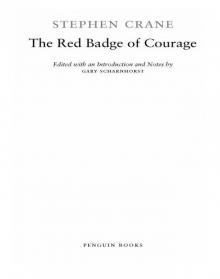 The Red Badge of Courage and Other Stories
The Red Badge of Courage and Other Stories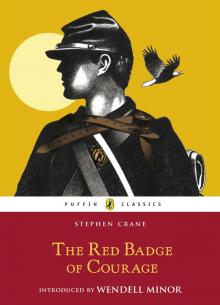 Red Badge of Courage (Puffin Classics Relaunch)
Red Badge of Courage (Puffin Classics Relaunch) The Fight: Whilomville Stories: XI.
The Fight: Whilomville Stories: XI. A Man and Some Others.
A Man and Some Others. The Monster
The Monster